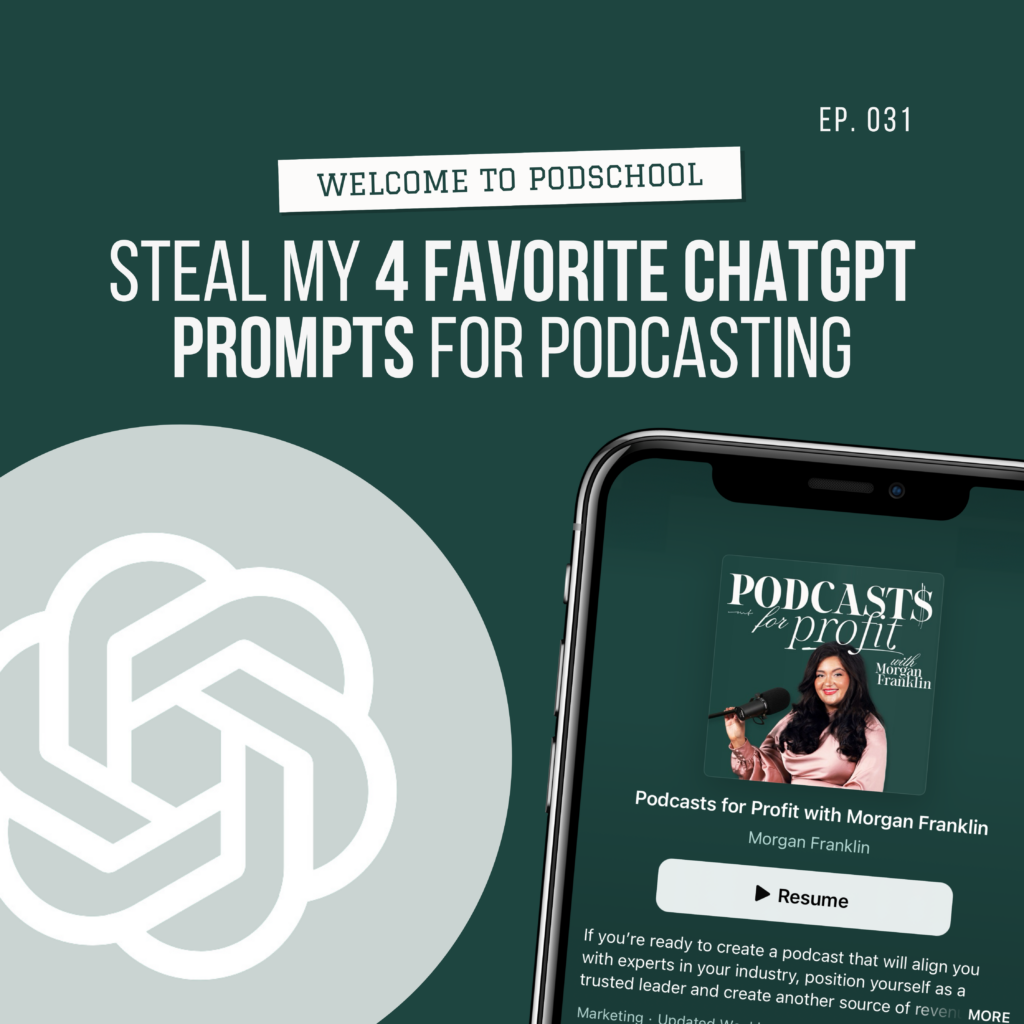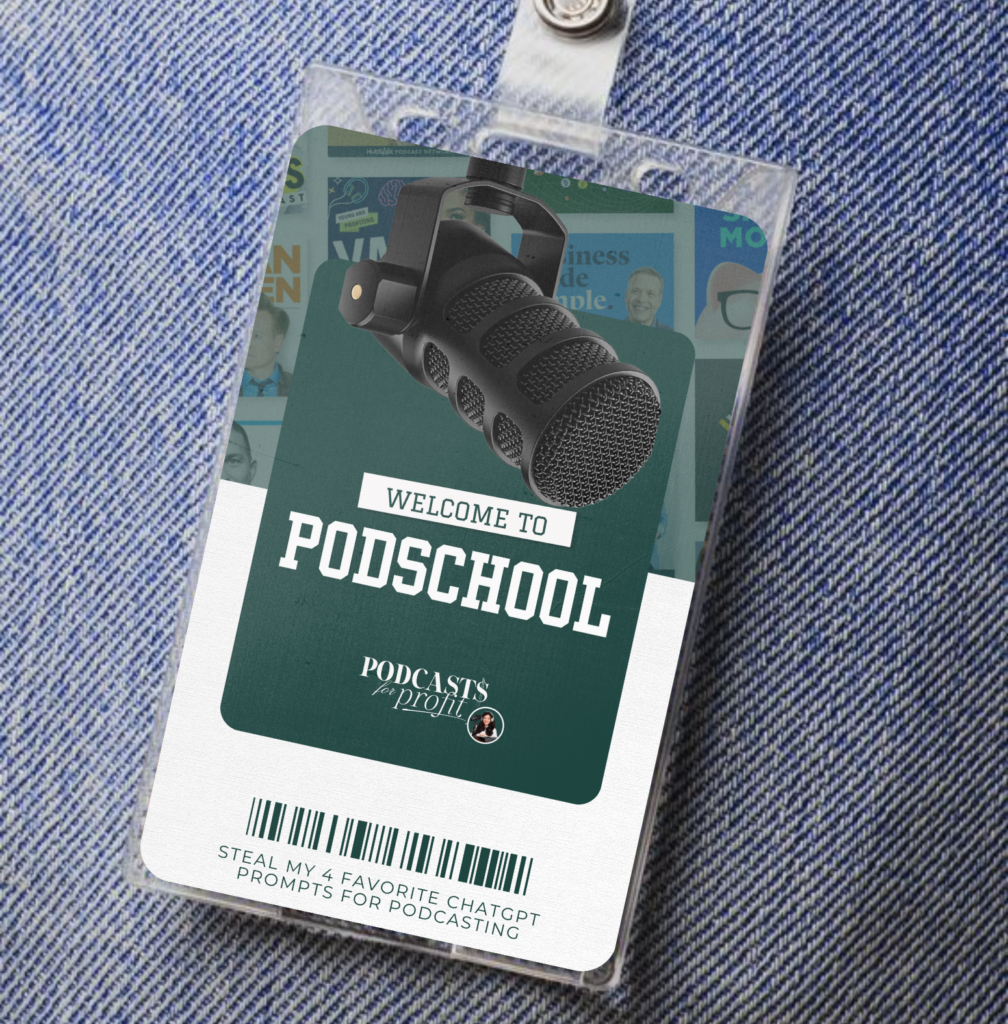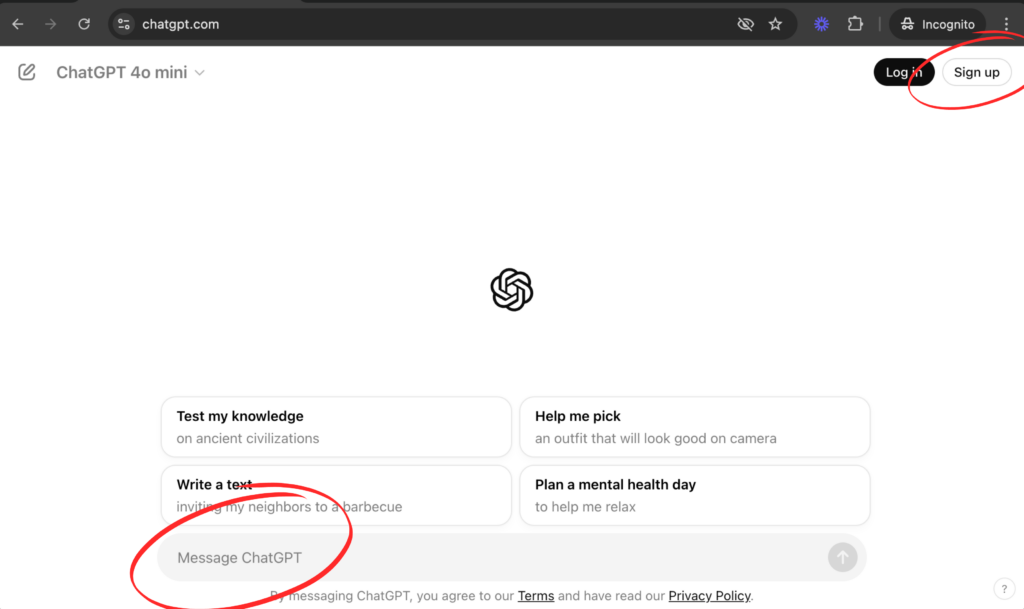PodSchool: Steal My 4 Favorite ChatGPT Prompts for Podcasting
September 30, 2024

Listen to This Episode: Apple Podcasts | Spotify | GoodPods
Welcome to PodSchool—today, I’m sharing one of my favorite tools for podcasting: ChatGPT.
ChatGPT has been a game changer for my podcast, helping me streamline everything from content creation to promotion. And the best part? I’m going to walk you through four of my favorite ChatGPT prompts that I use every week.
If you want to save hours on production, content creation and maximizing your podcast’s workflow, these prompts are for you.
But first, if you want the exact prompts and structure I use, you can download them for free right here.

GET YOUR FREE DOWNLOAD WITH ALL TEMPLATES HERE 👇🏼👇🏼👇🏼
How to Use ChatGPT to Enhance Your Podcasting Workflow
Before I get into the prompts, it’s important to understand how ChatGPT works. This tool isn’t just going to read your mind—it needs clear instructions. Think of it as your personal podcast producer, but it’s only as good as the prompts you give it. The more specific you are, the better the results.
So, if you’ve never used ChatGPT before, no worries. You can sign up for free at ChatGPT’s website. Once you’re in, it’s as simple as typing your prompt into the query bar, but let me show you how to make those prompts work for you.

Prompt #1: Unlimited Podcast Episode Ideas
Thinking of good podcast episode ideas can be one of the most annoying parts of being a podcaster. There’s always another week and another idea you have to come up with. This is how I want you to create a prompt that will help you come up with unlimited podcast ideas. Reminder: download your prompts here.
Why this works: Let me point out a few things about this prompt. This is why setting the scene for ChatGPT is so important, and you might want to take it a step further by telling it about yourself. ChatGPT only knows what you tell it – so make sure to take the time to tell it about your target audience, tell it the mission of your show, any information you can give, give it and always ask if the ChatGPT has more questions for you.
If I’m looking for 5 good ideas, I’ll ask for 20, because I’ve found most of the time the chat will think of episode ideas I’ve already done, or ones I don’t want to do. Give yourself options when you’re asking it to do something for you.
Prompt #2: Creating Podcast Episode Outlines
I use this prompt every week, multiple times a week. And I’m going to give you the tip that has changed the way I outline episodes for other podcasters.
This will depend on the way you like to outline your podcast episodes and how many hosts you have, and what you’re trying to cover in your episode. So take this template and customize it to your needs, but this is what I’d start with to give me a good outline for a podcast episode. Reminder: download your prompts here.
Why this works: The big change that’s helped me so much as a podcast producer and in my own show is having it ask me questions to answer as it pertains to the episode. This is incredible and it will help you to think of information you never would have before. Having a well outlined episode will help your podcast grow more than anything else, so take the time and start making outlines for your episode to make sure you’re hitting every point you want to talk about and you’re keeping the information organized for your listeners.
Prompt #3: Writing Search Engine Optimized Blog Posts
Writing blog posts is a pain in the neck, but it’s so necessary if you’re trying to rank on Google or any other search engine. So make it easier on yourself and use a prompt to use your transcript to help you write a blog. When I say blog, I’m not meaning episode description. Two different things, this is a question I get all the time, so I’ll address it again. A blog for an episode is a free standing piece of content on your website that’s for one specific episode, it could contain other media associated with that episode, with links of where to listen, but it’s a piece of content on its own. Episode description is what you can see wherever you’re listening to this episode, that’s what’s popping up with the episode on Apple Podcasts or Spotify or wherever you listen to podcasts. There’s nowhere else you have to go. Reminder: download your prompts here.
Why this works: I have tried a lot of prompts for writing blogs that don’t suck, and this one is the best I’ve come up with so far. You will have to tweak a few things, but it will give you a blog post that’s readable and provides good information for the person reading.
If you don’t have a transcript of your episode you can use a service like Otter.AI to transcribe the episode, or you can upload it to YouTube and copy and paste the transcription for free!
Prompt #4: Creating Content Ideas from Your Episode Transcript
There’s nothing worse than having an episode and working so hard on it and realizing you have no clue how to promote this episode, and you don’t have the energy to actually do it if you did. Reminder: download your prompts here.
Why this works: This is a game changer for me, especially when I’m feeling tired or I really don’t want to be on social media. This prompt is incredible.
Need Help Making Your Own ChatGPT Prompts?
ChatGPT can be used to help with so many parts of podcasting, promoting your podcast, making money podcasting. If you want more episodes about how to use ChatGPT for your podcast please let me know.
If you need help building personalized ChatGPT prompts for your podcast send me a message here!
Again, all the prompts used today are linked in both the episode description and the blog for this episode. You can access both below. Remember, test, tweak and use ChatGPT as a tool and not a crutch.
GET YOUR FREE CHATGPT TEMPLATES HERE! 👇🏼👇🏼
Never want to miss an episode, launch or discount code? 😬 Join my e-mail list!
I will never sell your information, send you spam or be a bad penpal.
Hi, I’m Morgan Franklin. I help business owners and podcasters make money from their podcast. Whether you’re a business owner tired of trying to cut through the noise of social media, a podcaster trying to monetize their existing podcast or you want to start a podcast that will engage listeners and create future buyers. You’ve come to the right place! Through my podcast, 1:1 strategic planning, courses and free resources I’ve helped countless podcasters and future podcasters and I can’t wait to talk to you!
PRIVACY Policy | TERMS OF SERVICE | Earnings disclaimer | Terms of Purchase
© MORGAN FRANKLIN MEDIA 2024